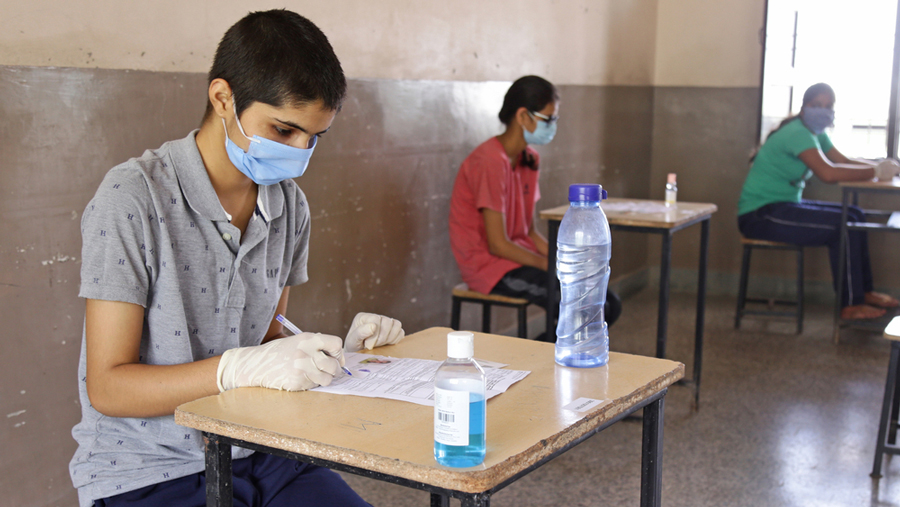
Hollow test Examinations are but tools of ideological control
Don't Miss
I first encountered My Early Life a few months before my Class X boards when my father — who had lived through the Second World War, and was, as a consequence, a great admirer of Churchill (even though he had to admit that the man’s attitude towards Indians left much to be desired) — decided it would soothe my frazzled nerves if I read about young Winston’s encounters with examinations. I suspect the effect was not quite what he had hoped for. Instead of cheering me up about, and preparing me for, the forthcoming ordeal, my nerves got even more frazzled, especially when I contemplated the vast oceans of my ignorance as compared to the little puddles of learning I had somehow managed to acquire, and I became convinced that there was no way in which I would get a passing grade. In the event, like the British Bulldog, my luck held, and I managed to get a creditable result, the first of many I would acquire — more by accident than by conscious design — over the next many years. But my deep suspicion about examinations, especially the formal ones conducted by educational institutions, never left me.
Which is deeply ironic when one considers the fact that, for the last almost-thirty years, I have been preparing those instruments of torture called question papers, and passing judgment on the performance of young minds which are, almost invariably, scarred (to a greater or lesser degree) by the experience of taking examinations. Consider the circumstances in which most examinations are conducted, at least in our country. You are made to sit in a closed room, guarded by unsmiling invigilators, unable to ask your neighbour for a simple fact, prevented from looking up a quick reference, needing to take permission if you want to go to the toilet — in brief, the closest most of us will get to a PoW camp. I cannot think of any other situation in life which even comes close to the stifling, oppressive atmosphere of a typical examination hall. And for what? What do such examinations actually test? Certainly not the examinee’s intelligence, or knowledge, or wisdom, or creativity, or understanding, in any meaningful sense of these terms. At best, perhaps the ability to memorize and regurgitate “facts”, and to do so in a reasonably organized manner. What doing well in an examination tells us is one thing, and one thing only — the candidate’s ability to do well in exams. Nothing more and probably quite a bit less.
As Churchill had noted, luck plays an inordinately important role in examinations. I have had many classmates over the years who were far more knowledgeable, and much better prepared, than me, yet who failed to do as well in a particular examination simply because they were unlucky in the choice of topics they had prepared while I wasn’t; so they cursed their luck, and I claimed it was all due to hard work and consistent labour (which was far from the truth). When still an undergraduate student, one of my teachers told me that I would do well in the finals, not because I was knowledgeable or intelligent, but because I possessed “low cunning”. Upset though I was then with what I felt was an unnecessarily cruel remark, I have since come to recognize the wisdom of that statement. Examinations are basically tools of ideological control, where — in order to score well — the person taking the examination has to figure out not just what to write but how to write it — to become, as it were, his or her master’s voice. If one can do it successfully, one does well; if one tries to be different, to express one’s own views, to interpret matters creatively, from a perspective other than that “prescribed” by those who are conducting the test, one fails — often, quite miserably — and has to live with the stigma of unsuccess, maybe even for the rest of one’s life.
One of the guiding principles of power is the need to remind the one being controlled of just who is doing the controlling. Even as the ongoing pandemic has opened up avenues for a more democratic, more egalitarian, more cooperative process of learning and evaluation, it has also provided the opportunity to those wielding power to forcefully remind the underdogs just who is boss. As students across the country grapple with poor internet connections, lack of access to books and other resources, the inability to consult others face-to-face, and much else that is necessary to confront the terminal examinations now underway, as a result of the diktats of the highest functionaries of the land, they must be cursing their luck and those like me who are enforcing this ordeal on them. After such knowledge, what forgiveness can we expect?
The author is professor of Comparative Literature, Jadavpur University, and has been working as a volunteer for a rural development NGO for the last 30 years


0 Response to "Hollow test Examinations are but tools of ideological control"
Post a Comment
Disclaimer Note:
The views expressed in the articles published here are solely those of the author and do not necessarily reflect the official policy, position, or perspective of Kalimpong News or KalimNews. Kalimpong News and KalimNews disclaim all liability for the published or posted articles, news, and information and assume no responsibility for the accuracy or validity of the content.
Kalimpong News is a non-profit online news platform managed by KalimNews and operated under the Kalimpong Press Club.
Comment Policy:
We encourage respectful and constructive discussions. Please ensure decency while commenting and register with your email ID to participate.
Note: only a member of this blog may post a comment.